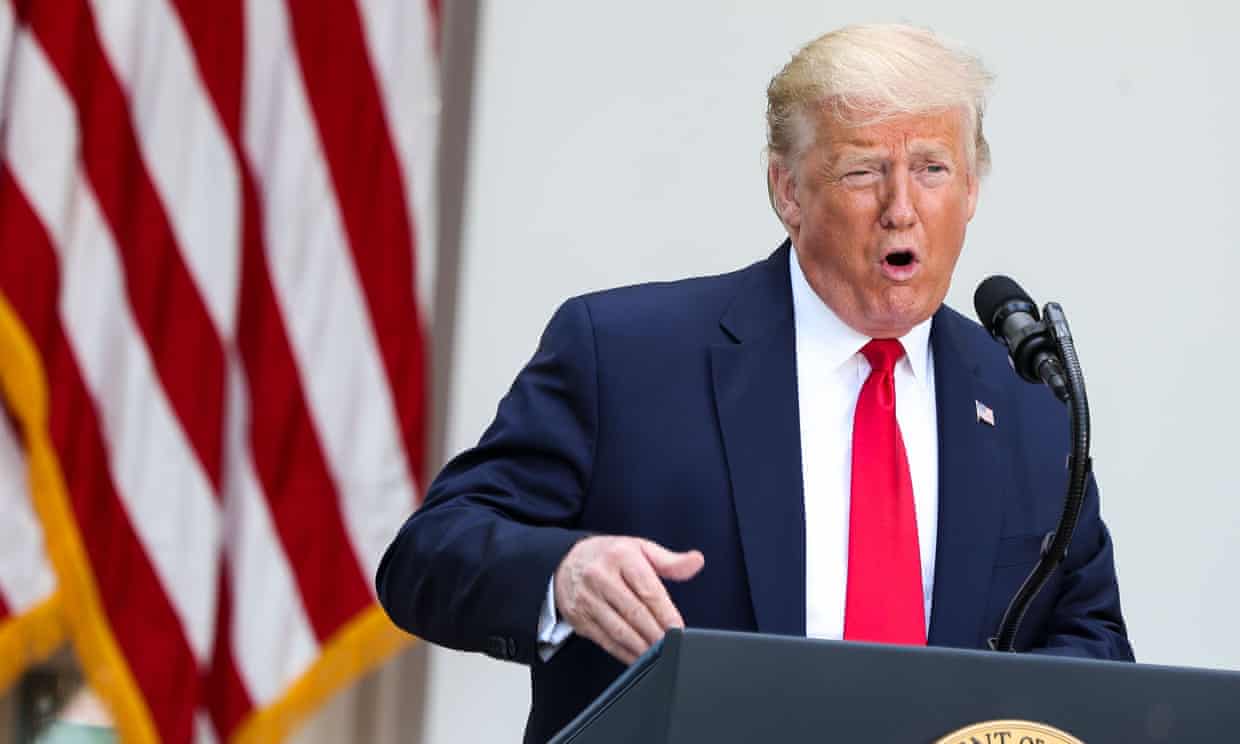
Donald Trump
Trump threatens social media after Twitter puts warning on his false claims
by Tom McCarthy- Twitter added warning on tweets that spread falsehoods
- President vows to ‘strongly regulate … or close them down’
Donald Trump has threatened to “strongly regulate” or close down social media platforms that do not meet his standards for ideological balance, a day after Twitter, for the first time, slapped a warning label on a pair of Trump tweets spreading lies about mail-in voting.
“Republicans feel that Social Media Platforms totally silence conservatives voices,” Trump tweeted on Wednesday morning. “We will strongly regulate, or close them down, before we can ever allow this to happen.”
Kayleigh McEnany, the White House press secretary, told reporters traveling onboard Air Force One on Wednesday that Trump soon planned to sign an executive order on social media companies, but details remained scant.
Trump also repeated his attacks on mail-in voting, which is common in the United States but could expand further during the coronavirus pandemic. Republicans fear that an expansion of the franchise could result in their members being ejected from office.
Trump in the past has made threats about media censorship that he did not then act on, and any attempt by the White House to shutter a media organization would encounter first amendment challenges in the courts. In 2018 a federal judge ruled the president could not block people on Twitter, because it violates their first amendment rights to participate in a “public forum”.
As his election-year polling numbers have deteriorated, however, Trump has grown increasingly wild in his threats against media organizations and the voting system, and more aggressive in removing mechanisms for oversight in the federal government and in installing loyalists. His takeover of the federal courts could put future first amendment claims on new and dangerous ground.
“It’s disturbing that the president misunderstands the first amendment so fundamentally,” said Jameel Jaffer, the executive director at the Knight First Amendment Institute at Columbia University. “The only first amendment issue here arises from the president’s threat to punish Twitter in some way for factchecking his statements.”
Most recently, Trump’s attacks on mail-in voting and on a cable news host, Joe Scarborough, have created controversies and put a great deal of pressure on Twitter, Trump’s preferred bullhorn, to modulate the president’s speech.
The husband of a former aide to Scarborough, who died when the MSNBC host was a member of Congress, formally asked Twitter this week to remove “horrifying” tweets by Trump wrongfully and recklessly accusing Scarborough, a frequent Trump critic, of murder.
Twitter declined to remove those tweets, citing a relatively new policy crafted with Trump in mind to allow itself to leave up tweets by “world leaders”.
But the company took unprecedented action on Tuesday in response to lies tweeted by Trump about mail-in voting. Twitter added links to the Trump tweets inviting users to “get the facts about mail-in ballots”.
The company confirmed its decision was in keeping with its “civic integrity policy”, which bars users from “manipulating or interfering in elections or other civic processes”.
Trump falsely claimed that state secretaries of state were mailing ballots to every citizen, and that mail-in voting invited fraud. In fact, the secretaries in question, including Republicans, had only mailed out ballot applications – not the ballots themselves – and mail-in voting, which is common in 34 states and Washington DC, has not been vulnerable to fraud. Trump himself voted by mail in a primary this year in his home state of Florida.
Trump’s eldest son, Donald Trump Jr, a frequent Twitter combatant in his father’s cause, said the platform was more likely to ban “a conservative for saying something not” politically correct than to ban attacks on the president from the left. Trump Jr linked to a recent tweet by the comedian Kathy Griffin suggesting that Trump inject air, which the platform has not challenged.
Claims that Twitter polices content from the right more aggressively than content from the left have been the subject of US Senate hearings, but no conclusive data has been compiled, in part because most of the most blatant violations of the platform’s rules, racist and hate speech, are categorized as “conservative”.
In the past, Trump has praised Twitter for allowing him to take his message directly to followers, and despite his claims of being “silenced”, social media platforms have been a boon for Trump. His current campaign has rebuilt a targeted advertising operation on Facebook that was widely credited with helping Trump win in 2016. Platforms like Facebook and Twitter were – and are – staging grounds for foreign propaganda campaigns meant to scramble and empoison US politics and society. Those campaigns have also been credited with helping Trump’s 2016 victory.
The federal government has in the past attempted to enforce ideological balance for broadcast television, where licenses are controlled by the Federal Communications Commission. The FCC enforced a “fairness doctrine” for 40 years after the second world war, and still enforces an equal-time rule requiring stations to give competing political candidates the opportunity for equal exposure.
Reuters contributed reporting